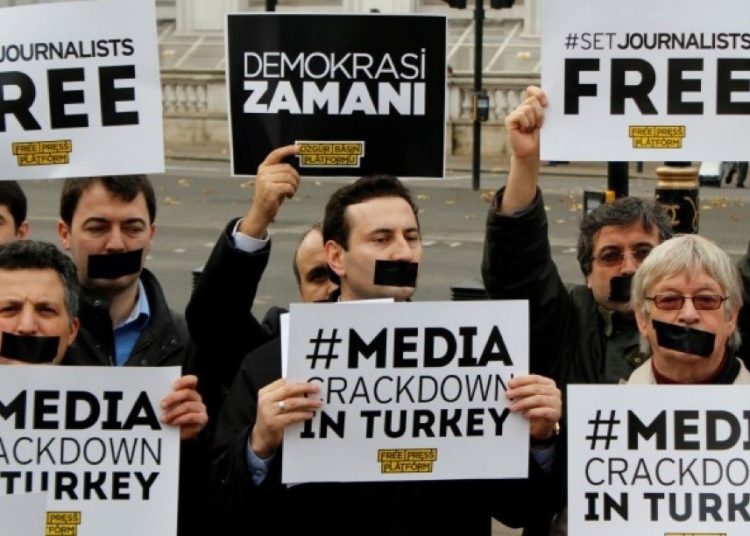Abdullah Bozkurt
A security cooperation agreement between Turkey and Ecuador reveals how the Turkish government considers international security mechanisms to be a convenient tool for political persecution, cracking down on exiled journalists and harassing government opponents.
The text of the agreement, obtained by Nordic Monitor, contains ambiguous phrases that could be used by the Turkish government to repress journalists living in exile and critics outside the country.
“In the fight against terrorism, the Parties shall prevent the activities of visual media and writings of the terrorist organizations and their representative institutions operating in their territory against one of the Parties,” Article 2 (1.2.a) states, adding that “the parties will consider them as illegal organizations, to which they shall take appropriate measures in accordance with their national legislation.”
According to the text, Ecuador can prosecute journalists who are defined as terrorists by President Recep Tayyip Erdoğan’s radical Islamist government and treat their media outlets as terrorist entities. Turkey in recent years has been the leading jailer of journalists worldwide with a record number of 183 journalists behind bars. They were all accused of terrorism or association with terrorist groups, and their assets were seized, while 195 media outlets were shut down.
The agreement also gives rise to serious concerns of the possible arrest of Erdoğan critics who live in Ecuador or neighboring countries. “The parties shall develop and apply effective measures in relation to individuals and institutions that provide financial or other support, including shelter, accommodation, training and treatment and logistical support to terrorist organizations in their territories,” Article 2 (1.2.b) states. It is obvious that Turkey’s National Intelligence Organization (MIT) may benefit from the ambiguity of the article to conduct operations on Ecuadorian soil targeting dissidents.
Furthermore, the same article connects the activities of legal organizations to terrorism. Such uncertainties in the diplomatic documents pave the way for President Erdoğan to pressure foreign governments to hand over schools and other institutions affiliated with Erdogan’s arch-foe, Fethullah Gülen, to the Maarif Foundation. Gülen revealed that he rejected Erdoğan’s demand to tap schools operated by businesspeople aligned with his movement for use in promoting the Turkish president’s political goals, which prompted the Turkish government to establish Maarif in order to compete with and take over Gülen schools.
The agreement was signed on February 4, 2016 in Quito by Turkish Foreign Minister Mevlüt Çavuşoğlu and Ecuadorian Interior Minister Jose Serrano. The 13-article agreement was submitted to the Turkish parliament for ratification on June 25, 2019 by President Erdoğan.
The letter submitted to parliament seeking approval of the agreement with Ecuador:
On one hand, previous reports by Nordic Monitor have exposed how Turkish diplomats plotted the deportation of critics who live abroad. On the other, Turkey has been criticized in several documents by international bodies for abusing Interpol’s law enforcement mechanisms in order to silence Erdoğan critics from all segments of Turkish society. According to these reports, Turkey had sought Red Notices for 60,000 individuals in 2016. A report by the Stockholm Center for Freedom (SCF) stated that the Turkish government has abused Interpol’s Stolen and Lost Travel Documents (STLD) database by “claiming missing, lost or revoked passports and travel documents for critics and opponents who, in many instances, are not even aware that their passports and travel documents have been invalidated.”
The text shows that security agreements have emerged as another apparatus used by the Erdoğan government to suppress exiled journalists and Erdoğan critics.
The party states to the Ecuador-Turkey agreement pledge to cooperate in fighting terrorism and its financing, cross-border crimes, the illicit production and trafficking of narcotics, the smuggling of persons, the illicit trafficking of firearms, the counterfeiting of currency and all kinds of official documents, and mafia-type criminal organizations.
The two countries have also committed themselves to working on information and intelligence sharing, operational cooperation assessment regarding terrorist organizations and the financing of terrorism and techniques used in the fight against terrorism.
The agreement allows both sides to appoint liaison officers to increase the efficiency of interaction and coordination of joint actions. According to the text the party states will carry out programs and projects, provide training and technical support, donate equipment and consulting, and promote cooperation between their law enforcement organizations.
The terms of the agreement will be executed by the interior ministries of both sides. The deal is in effect for five years with automatic renewal. According to the agreement, either party may notify the other at any time of the intent to terminate.
The nine-page security agreement is posted below:












